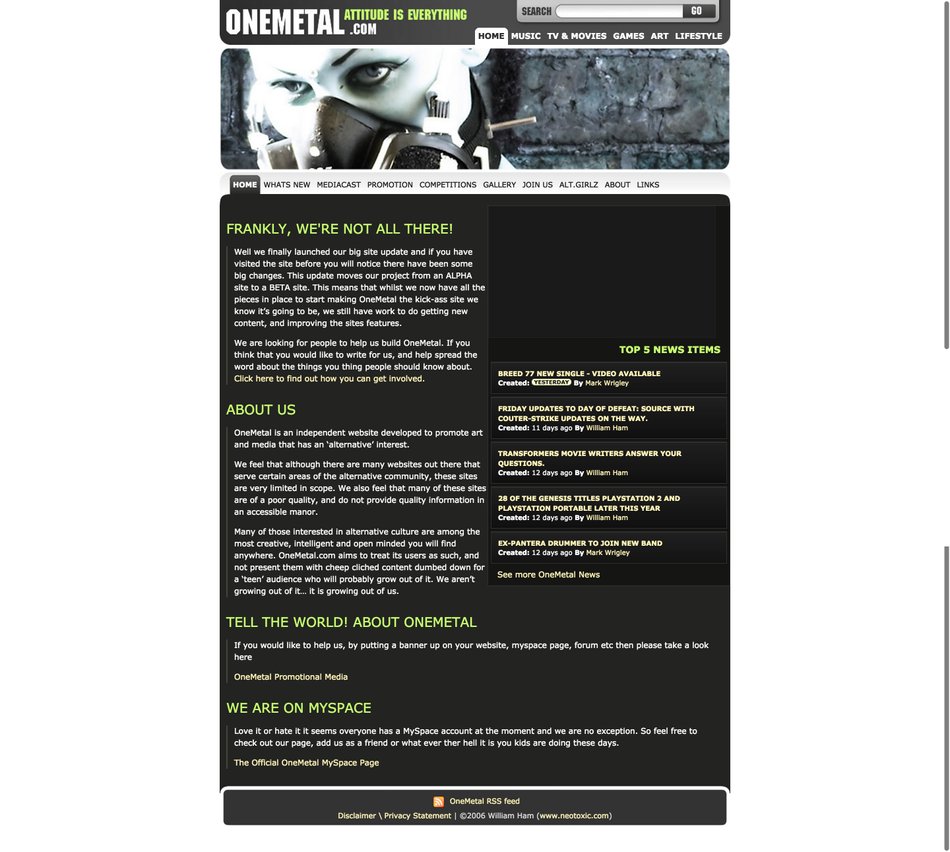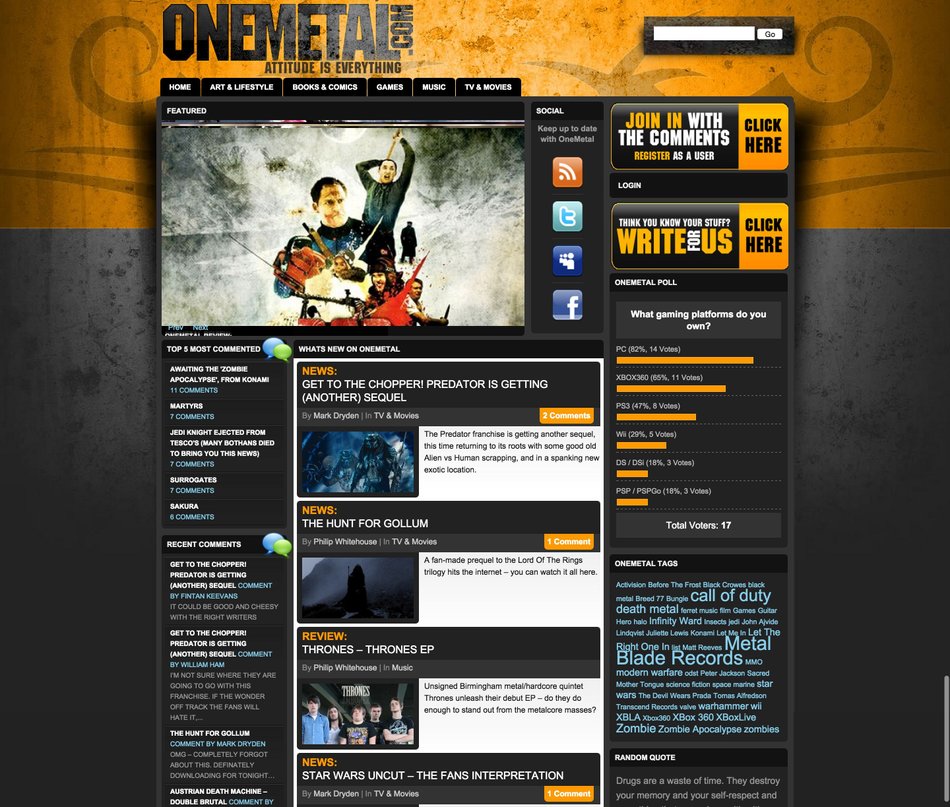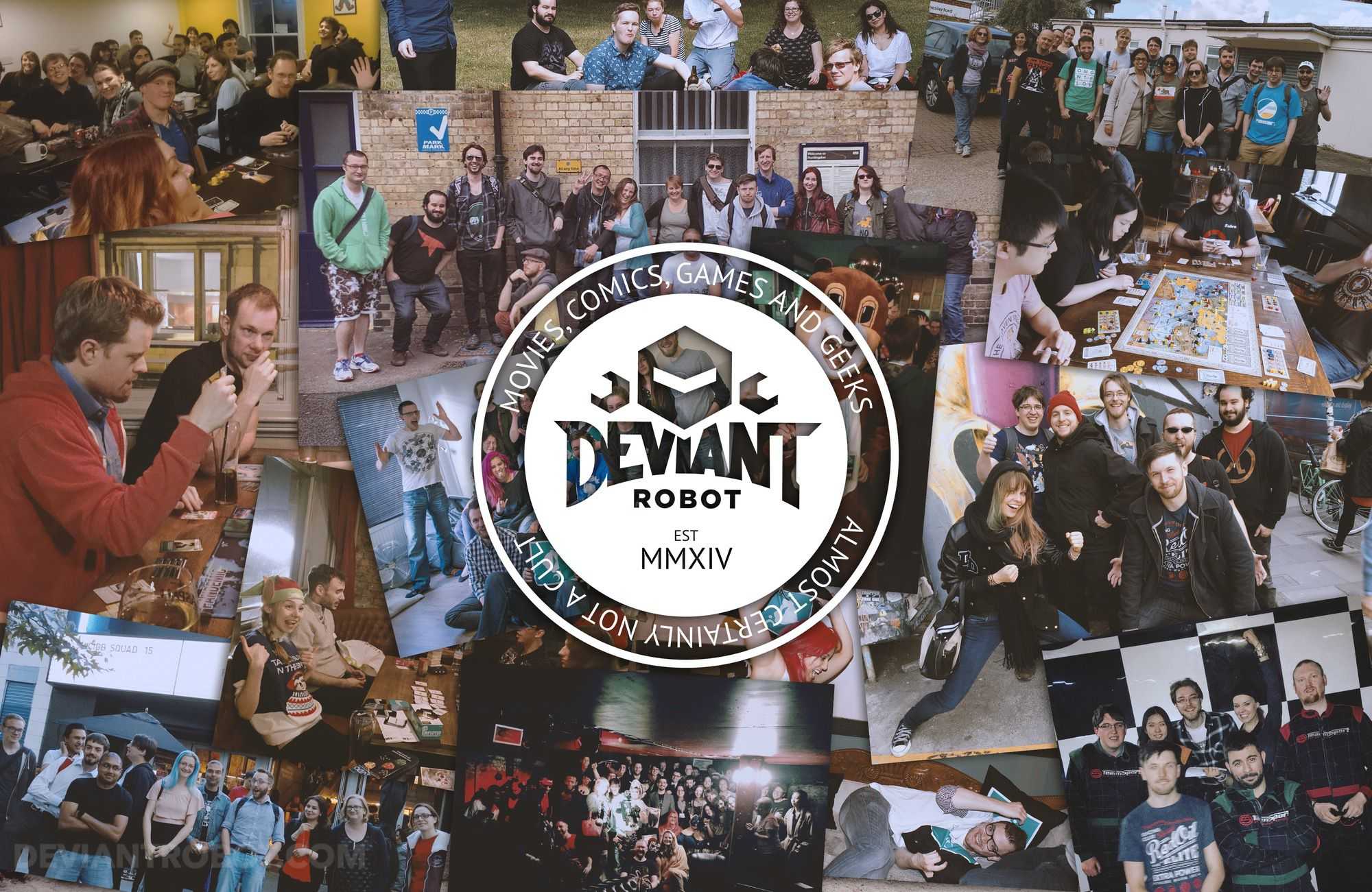The rise, fall and rebirth of Deviant Robot
At the beginning of 2019, I made the difficult decision to end Deviant Robot's involvement with the social and tabletop meetup groups I started back in 2014. While I think it was the right choice to step down; I fear this decision may be interpreted as a rejection of those groups and what they have become. I hope this post will help explain that is not the case and provide some context to my decision for those who are interested.
Before I start
I am writing this for those wanting to understand why I stepped down from running the Deviant Robot MeetUp events in 2019. I hope there maybe something others can learn from my experience. What follows is, of course, my perspective on events spanning many years. I have done my best to offer as honest an account as I can.
Deviant Robot was born
Deviant Robot was born out of my former project; OneMetal.com; a heavy metal news and reviews website. The project was created for the community of metal-heads; and it was my view that those who shared an interest in the music, were also likely to share an interest in other things. As a result we also featured content on comics, video games, and movies. However whilst there were a lot of metal-heads who enjoyed the non-music content, not everyone who might like this content were metal-heads. As a result it felt like we were missing out on a chance to engage with a wider audience.


Deviant Robot was originally conceived of as a platform to provide a better home for OneMetals non-music content. One that didn't filter out those not interested in a single music genera. And so on the 25th of May 2014 I and a small team of writers launched DeviantRobot.com and we began publishing new content.
The idea of running Deviant Robot events was there at the beginning, but it seemed a long way off; that is until someone on the team suggested looking at MeetUp.com.
Meetup.com
Meetup.com is a website that helps people discover, organise and arrange regular real-world events. It seemed a good fit; or at least worth a go. We would see if we could find a community inspired by the content of the website; and perhaps the website and community could grow together.
I had never attended a MeetUp before and wasn't sure how meetups worked, or what people might expect from these events. I went along to two geek orientated MeetUp events in London. They were fun, but based on my experience I felt we could improve on the approach.
We set out to book a venue and launched our MeetUp page. We formed a plan, and I roped in some like-minded friends and members of the writing team. We made T-shirts with the Deviant Robot logo on the back and wore name badges so people would know who we were.
On July 8th 2014, at the Star of Kings in London we ran our first event. Almost immediately, the meetups changed everything.
The Big Bang
Our first event was vastly more successful than we ever expected, starting a trend that would continue with each subsequent event in the early years. We were extremely lucky that a fantastic and diverse group of people turned up and seemed to resonate with what we were trying to do. The meetups grew to dominate the project, as we swapped intangible website traffic for the manifest flesh and blood of attendees.
Eventually, we abandoned the reviews and articles on the site and began running an ever-growing number of events.
Video from our first ever event in London
The format
The main monthly events were a mix of games and conversations. We would officially start with an introduction speech, letting people know about the team, what the plan for the event was and making any announcements about upcoming events. We encouraged attendees to interact with each other, and to talk about interesting topics with strangers to gain new perspectives. Tabletop games were one of several tools we would use to get people talking. We made sure that games were hosted by a member of the team, who ensured new members were encouraged to join in and prevented strong personalities from dominating. We would also emphasised large group activities; these prevented smaller groups from forming at the expense of members getting to know the wider community.
It was all very civil, lively and friendly. We became very good at turning strangers into friends; and importantly started to build a community identity.
Key to our success was the Deviant Robot team. The team were there to make sure everyone else had the best time possible. Being a team member was hard work but also fun and rewarding. The team would run games, welcome people as they arrived, help people who weren't sure what to do and be constantly on the lookout for anyone who might look isolated or a little lost. Such members were always approached by the team and introduced to others who were chatting or playing games. Pleasingly after a while community members started to reflect and adopt these behaviours themselves at the events.
An intro speech from an early London event
Am I joining a cult?
An unexpected consequence of how well organised we were was that people were initially a little suspicious. There was genuine, and perhaps understandable uncertainty about who it was that was running things. This mystery I was happy to lean into; announcing in my next introduction speech that we were "Almost certainly not a cult". Almost certainly not being a cult quickly became an in-joke amongst the group members who, to my surprise and delight, were now proudly identifying themselves as 'Deviants'.
Moar events!
Unique monthly events were quickly augmented with various weekly sessions and other semi-regular events. We started running movie meetups, birthday events, discussion groups, parties and adventures where we would go out and visit places of interest. We launched additional groups in new locations around London, the UK and ultimately internationally. By 2017, Deviant Robot had two groups in London and groups in Leeds, Cambridge; Berlin, Germany and Melbourn, Australia.
There was a sense that this was the start of something special; it was an exciting time. It worked, but unfortunately, it didn't scale.
Unsustainable
A consequence of the increased number of events was that no particular event felt special in the way that it once had. The community would make special effort to attend monthly events, and the air of excitement around them was palpable. The events now felt routine. Missing an event no longer felt like a big deal as there would be another in a few days, and soon missing the odd one or two led to missing a few and perhaps losing interest altogether.
As we ran an increasing number of events and groups, the quality also suffered. Some of the magic was lost at scale and it wasn't just the community that felt the loss of momentum that came with it. Running these kinds of events takes significant effort, drive and commitment from the team and fatigue was setting in.
Exporting the culture to new groups; groups with different dynamics and personalities at the helm was almost impossible. The sense of what it meant to be a Deviant Robot group was unclear. The concept of being a member of Deviant Robot was ambiguous. There was no unifying component of the project; no shared connective tissue that meant that the various parts were not separate and independent entities.
For me personally, it felt that I was funding and supporting several independent groups and communities that did not understand my aspiration. From the perspective of a community member, this was of course not a problem. Whatever parts of the community you engaged with were all you were really interested in. Anything that confused or disrupted that community would likely feel like a bad thing. In short, the community had little reason to care about, or even notice the problems that were important to me as the project owner. In fact, they had every reason to resist the things I was trying to do.
Growth also put a lot of pressure on the team; all volunteers freely giving up their time to run and organise events. Key team members dropped out, often because of a change in life priorities; but also sometimes out of frustration that the project was not reaching their vision of success. The shear number of events we were supporting; as well as myriad attempts to implement policies to unite the communities meant that being a team member was feeling a lot less fun. Lots of online meetings resulted in frustration. The team members reflected the feelings of the community. There was a loss of interest in the wider ambition because it was coming at the expense of what they had once enjoyed about the project. With resources spread thin, pressure on individuals grew, and further team members began dropping out.
Apathy, Ego and pride
Apathy. I felt I was the only one battling against apathy. Apathy is death for a project like this; relying, as it did, on the support of a community and a team of volunteers. Not only did I feel I was the only one trying to hold back the tide of apathy, but that as the project owner I felt it was solely my responsibility. As apathy grew, I felt I was failing; letting the community, the team, and the project down. I was destroying the hard work everyone had put in. Worse still the more I tried to take control of the situation, and prevent the fractures from forming, the more I only seemed to make it worse. When the project was a success, I saw it as a success of the community and the team; however I alone was solely accountable for any and all failure of the project. If I had been a better project lead, if I had made smarter decisions or communicated more effectively, it would have worked. Everyone would have been happy, and the project would be a success. Or so I thought.
Running the project wasn't fun, but everyone assumed that I must be getting something out of it. Perhaps it was ego, or all part of a master plan? Perhaps I was simply manipulating people for my own ends? I wasn't. I didn't know what I was doing; accept mostly letting people down.
The constant battles with the team and community, the arguments with friends, the concern, stress and pressure took its toll over the years. I didn't want to give up; didn't want to admit defeat; but I could no longer tell if it was fear, pride or a belief in the project that was keeping me going.
The rise of table top
With limited team support, there was an increasing reliance on tabletop gaming to entertain our attendees. What once was just a tool for social interaction had become the focus of the events. A low effort way of entertaining a large group of people. The more challenging components of the events, such as the large group games and discussions, were quietly dropped as there were few people willing or able to run them. The team's organisation and commitment to engage with people suffered. As team member numbers became increasingly unreliable, trusted community members ran the games, but eventually they were run by anyone who wanted to.
Groups formed within the group and established friendship circles formed natural social barriers for new members. Without the team working to mitigate this, it became harder for new members to find a chance to engage in the way they once did. Exciting, unique monthly events gave way to regular tabletop "sessions". It was understandable, and perhaps inevitable. The new emergent style of events found a new audience and the culture quietly shifted underneath me.
Life and reflection
I started to no longer attend events. At first because I had other things on; but soon just because I couldn't face it. I started focusing on other parts of my life, which culminated in spending six months out in Japan. While I was out there, I came to realise that I needed to decide what I wanted to do with Deviant Robot.
Upon returning to England, I went along to an event and attempted to capture the spirit of the early events. Not unsurprisingly, whilst it resonated with a few people, the group mostly met this attempt with confusion and disinterest. The events had formed their own identity now. The new community was happy with what it was and rightly were unsure who I was; and why I would want to change things. Many of the original community members had already left; leaving only a few who had seen what the events were at the beginning. Whatever my original intention or aspirations had been, I now found I was running and supporting several tabletop social groups.
Trying to change that would now not only take a lot of effort, but even if it could be done, it had already proven unsustainable. Worse still; changing it would damage something that many people were getting value from. If I wanted to do something different, well, I would have to do something different.
Changing the story
And so it was that at the beginning of 2019, I found responsible community members, and handed the groups over to them. I asked that they rename the groups; as an indicator that they were now independent.
I felt good about this decision precisely because I knew it wouldn't change anything. The groups were independent in all but name in any case; they would continue and perhaps be all the better now I was no longer trying to make them something they weren't.
I received a surprising number of genuinely heartbreaking emails from people I didn't know; thanking me for the experiences and friendships people had formed at our events. It was a little overwhelming and a few even had me in tears. The stories they told made me sad that as things had grown I had not taken the opportunity to talk to more of the people who attended the events. It really was, after all, what they were supposed to be about.
Lessons learned
Identity
Without a clear identity it is impossible to grow without losing yourself along the way. You can inspire people certainly, but without a definite, well-defined foundation, inspiration alone is liable to produce imperfect copies of an idea. Superficially similar but potentially very different variations. The united front we presented masked inconsistent and often conflicting narratives about who we were.
Scarcity value
We might want rare and special events to happen more often; but its a wish that can never come true. The rare becomes common and if everything is special, nothing is special. Do fewer things, and make them exceptional.
The cost of success
One of the worst mistakes I made was that I allowed the weight of the project to fall upon myself alone. Taking on the accountability of it's success, and the burdon of meeting the expectations of others. I was afraid of letting people down. Rather than courageous, this was at best unhelpful and more often just damaging. I allowed the fear of letting people down to justify forgetting what was important. It led to me loosing friends, and prevented me from making new ones. Someone who once ran a community of thousands can count on one hand the friends he came away with as a result. The other can be for the ones I lost along the way. I should have taken the time to be there for the people I cared about, and paid more attention to the friendships I should have formed.
Until we meet again
Although we have gone our separate ways, I hope that those who attended our old events, and the many team members who made them possible will think fondly of my efforts, and forgive my many, many mistakes. I sincerely wish the new groups the very best of luck and continued success.
I hope that those who remember the mighty Robot will still feel they are, and will always be, a little deviant. Whatever comes next for Deviant Robot it will be all the better for learning from past mistakes. Whatever Deviant Robot becomes in the future, it will, of course, almost certainly, not be a cult.
The future
I hope I learned some useful lessons hera; because I still have plans for Deviant Robot, new plans, but also familiar ones. I think reflecting on the past is the only way to understand how to move forward more effectively. I still love the community, and I still believe the project can work. Time will tell.
This video was created in 2016, and captures some of the spirit of the project.
